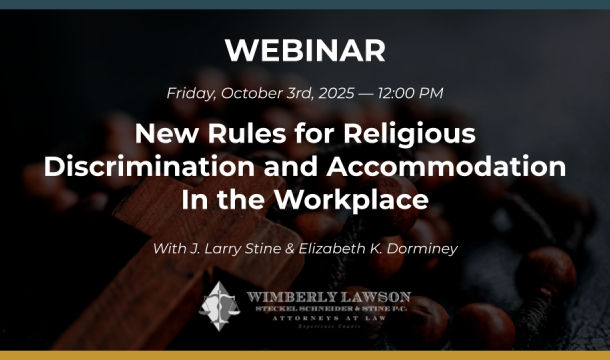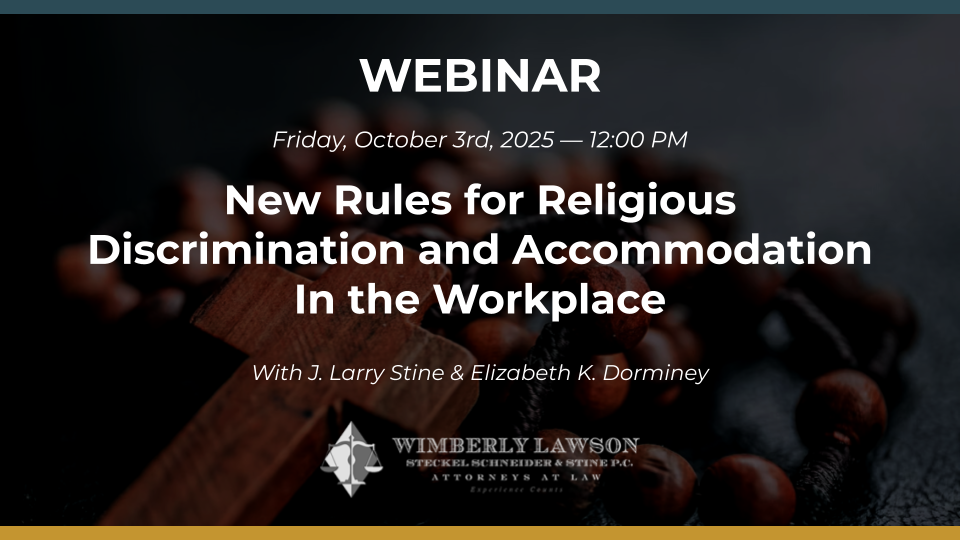NLRB OPENS UP EMPLOYER EMAIL SYSTEM TO UNION ORGANIZING
On December 11, 2014, the NLRB overruled its previous doctrine set forth in Register Guard, and ruled that employees have a Section 7 right to use their employer’s email system for union organizing purposes during their non-working time. Purple Communications, 361 NLRB No. 126 (December 11, 2014). In its 3-2 ruling, with the two Republican members dissenting, the Board presumes that employees have a rightful access to their employer’s email system in the course of their work with a right to use the email system to engage in Section 7-protected communications on non-working time. While the NLRB indicates that an employer may rebut the presumption by demonstrating special circumstances necessary to maintain production or discipline justifying restricting such rights, the discussion indicates that such circumstances will be rare. The Board majority further indicates that its ruling does not prevent an employer from establishing uniform and consistently enforced restrictions, such as prohibiting large attachments or audio/video segments, if the employer can demonstrate that they would interfere with the email system’s efficient functioning.
One of the first concerns raised by employers addressed in the majority opinion is that the rationale of the majority ruling would also extend to other company-owned property and equipment, such as copy machines, bulletin boards, conference rooms, pagers, tablet-computers, phone networks, and audio/visual equipment. The Board expressly limits its holding to the employer’s email system, but acknowledges that other interactive electronic communications, like instant messaging or texting, may ultimately be subject to a similar analysis. The Board also expressly refused to address what rights employees may have to communicate via their employer’s social media accounts.
A second issue raised in the dissenting opinions relates to a concern that the decision "effectively requires employers to pay employees for the time reading and writing emails directly or even tangentially relating to terms and conditions of employment. While the Board expressly limits these new rights to non-working time, the majority recognizes that email use may be more difficult to identify as occurring on working time or non-working time, particularly since the sender may be on non-working time but the receiver may be on working time. The majority fails to directly answer this concern, other than to acknowledge the blurring of the line between working time and non-working time regarding emails, and to state that it cannot turn the calendar back to a simpler era with clearer boundaries.
In response to the dissenting members’ concerns that the new rule will have a "debilitating impact on productivity," the Board majority acknowledges that employers can monitor for misuse and reduced productivity. In response to the dissenting members’ concerns that such monitoring will be deemed unlawful surveillance by the NLRB, the Board majority asserts that any surveillance activity by employers will be subject to the same standards that it applies to alleged surveillance in the brick-and-mortar world. The Board majority asserts that an employer’s monitoring of electronic communications on its email system would be lawful as long as the employer does nothing out of the ordinary, such as increasing its monitoring during an organizational campaign or focusing its monitoring efforts on protected conduct or union activists. The Board states an employer may notify its employees that it monitors (or reserves the right to monitor) computer and email use for legitimate management reasons and that employees may have no expectation of privacy in their use of the employer’s email system.
The dissenting Board members note the challenges associated with applying the standard set forth by the current NLRB majority. That is, the majority’s standards make it basically impossible for anyone to understand, in real time, what non-business emails, if sent, reviewed, and/or responded to using the employer’s email system, will and will not subject employees to lawful discipline or discharge. The dissenters contend there will be substantial confusion, and a significant risk of discipline and NLRB litigation, where the employer lawfully prohibits employees from reading or transmitting non-business emails during working time, and prohibits or limits employee access to the employer-provided email system outside of working time.
Editor’s Note: The Purple Communications ruling will require almost every employer in the country to revise its email policies. A further dilemma for an employer will be whether to modify its email policies now, or await a likely review of the Purple Communications ruling by a federal court of appeals. The nature of the issue, the history of NLRB rulings on the issue, and the strength of the two dissenting opinions, suggest that at least some circuits may not enforce the new NLRB ruling. The issue will be particularly sensitive in the course of any union organizational campaign, as unions will likely attempt to use the employer’s email system through employee organizers, and ask for an injunction for such use should the employer resist. Further, even if no injunction is granted, an employer’s policy that follows the earlier Register Guard ruling may result in objections to the election filed by the union should the employer prevail.
Related Content
Get Email Updates
Recent Content

Trump Nominates Appointments to NLRB and EEOC but Policy Changes Likely to Be Delayed

DOL Launches Self-Audit Programs Designed to Help Employers Improve Compliance

DOL Must Release EEO-1 Reports to the Public under Open Records Laws

Current Advice on Active-Shooter Situations

New Policy for Federal Workers and Religious Expressions

